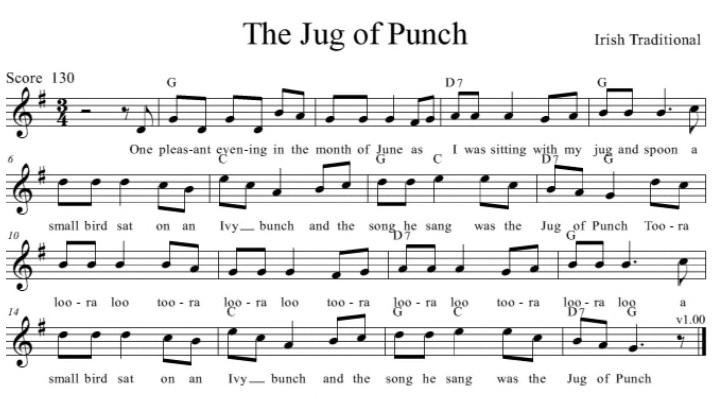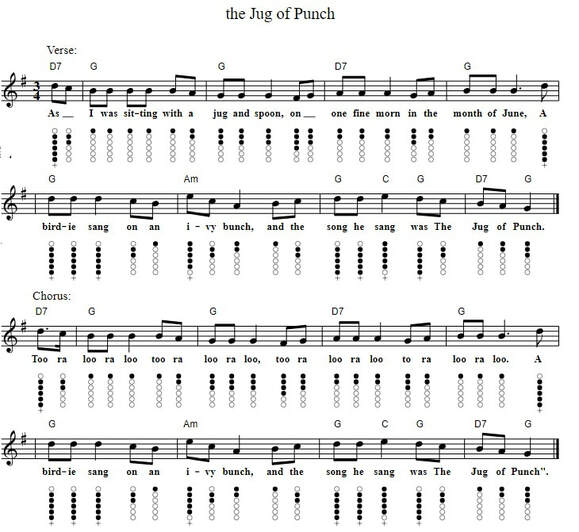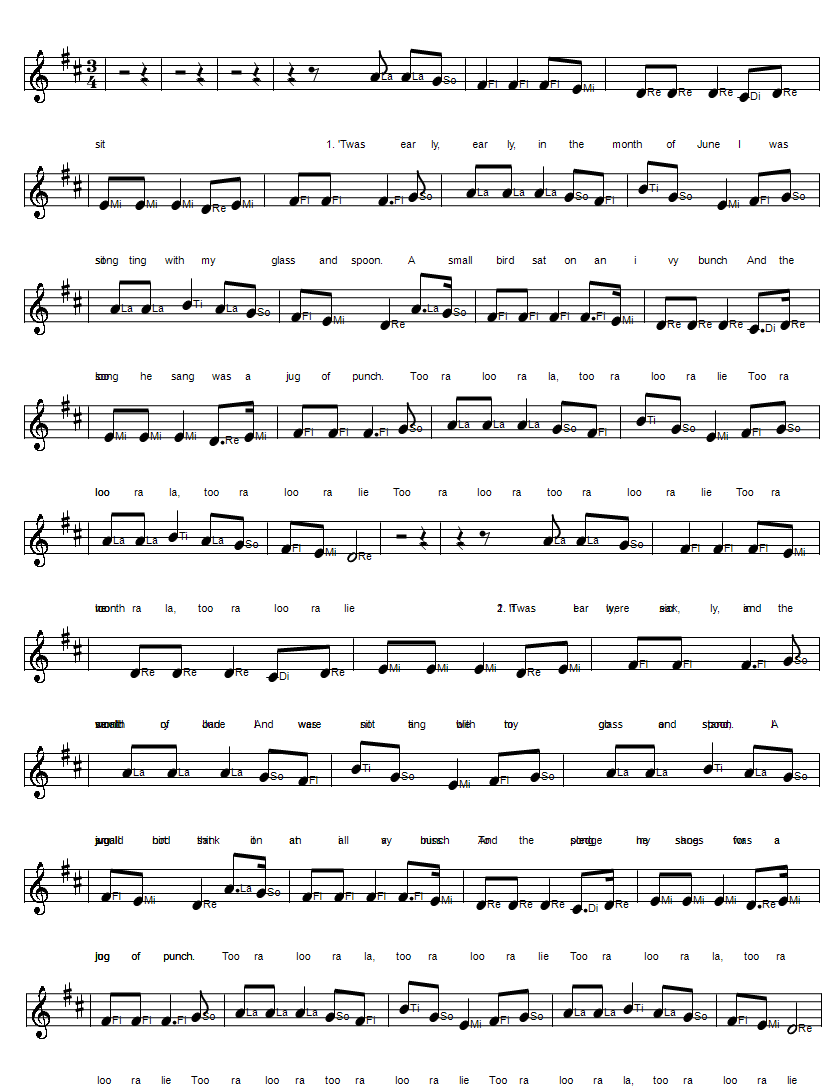The Jug Of Punch Lyrics And Chords
The Jug Of Punch Song Lyrics And Easy Guitar Chords. A Traditional. Jug of punch sheet music in solfege do re me format now added. The Dubliners version here with Luke Kelly singing with Jim McCann. Recorded by The Clancys, Altan, The Kingston Trio and The Jolly Beggarmen. Guitar chords in chordpro.The piano sheet music, plus pdf is included in a couple of version which have the tin whistle notes.
The Jug of Punch is a traditional Irish drinking song that has been passed down through generations and has become an integral part of Irish culture. Its lively melody and catchy chorus have made it a staple at pubs, parties, and celebrations throughout Ireland and beyond. Despite its popularity, the origins of the song are shrouded in mystery, with various theories and interpretations surrounding its meaning and significance. In this thesis, we will explore the history, lyrics, and cultural significance of The Jug of Punch and analyze its enduring appeal.
The origins of The Jug of Punch are uncertain, with some claiming that it dates back to the 18th century, while others argue that it is a more recent composition. The earliest written version of the song can be found in a collection of Irish songs published in 1873, but it is believed to have been in circulation long before that. One theory suggests that the song was inspired by a real-life event where Irish laborers in England were given a jug of punch as a reward for their hard work. Another theory posits that the song is a parody of a popular English drinking song, with the lyrics altered to reflect Irish culture and humor. Regardless of its specific origins, it is clear that The Jug of Punch has a deep connection to Irish history and has been sung and enjoyed by generations of Irish people.
The lyrics of The Jug of Punch are simple and repetitive, with a catchy chorus that invites participation. The song tells the story of a man who spends all his money on alcohol and is eventually left with nothing but a jug of punch. Despite his drunken state, he declares that he is the king of the revelers and encourages others to join him in his merriment. The chorus, which is repeated throughout the song, is a toast to the jug of punch and its ability to bring joy and camaraderie to all who partake in it. The lyrics of the song are steeped in Irish culture and humor, with references to Irish slang and phrases. This adds to the song's charm and makes it a beloved part of Irish heritage.
The Jug of Punch has become a symbol of Irish conviviality and has been embraced by Irish people all over the world. It is often played at Irish gatherings, from small family gatherings to large festivals and celebrations. The song's upbeat tempo and joyful lyrics make it a perfect accompaniment to the lively atmosphere of Irish pubs, where it is often sung by patrons while raising their glasses in a toast. The song has also been covered by various artists, both traditional and contemporary, cementing its place in popular culture.
One of the reasons for The Jug of Punch's enduring appeal is its ability to bring people together. The song's message of camaraderie and celebration resonates with people of all ages and backgrounds, making it a unifying force within the Irish community. Through its lyrics and melody, the song evokes a sense of nostalgia and pride in one's Irish heritage, creating a strong sense of cultural identity and belonging. It is also a reminder of the importance of enjoying life's simple pleasures, such as good company and a pint of punch.
In conclusion, The Jug of Punch is not just a song, but a cultural phenomenon that has stood the test of time. Its origins may be shrouded in mystery, but its impact on Irish culture and identity is undeniable. Its lively melody and catchy lyrics have made it a beloved part of Irish heritage, and its ability to bring people together in celebration and camaraderie has solidified its place in popular culture. As long as there are Irish people, The Jug of Punch will continue to be sung and enjoyed, preserving its legacy for generations to come.
The origins of The Jug of Punch are uncertain, with some claiming that it dates back to the 18th century, while others argue that it is a more recent composition. The earliest written version of the song can be found in a collection of Irish songs published in 1873, but it is believed to have been in circulation long before that. One theory suggests that the song was inspired by a real-life event where Irish laborers in England were given a jug of punch as a reward for their hard work. Another theory posits that the song is a parody of a popular English drinking song, with the lyrics altered to reflect Irish culture and humor. Regardless of its specific origins, it is clear that The Jug of Punch has a deep connection to Irish history and has been sung and enjoyed by generations of Irish people.
The lyrics of The Jug of Punch are simple and repetitive, with a catchy chorus that invites participation. The song tells the story of a man who spends all his money on alcohol and is eventually left with nothing but a jug of punch. Despite his drunken state, he declares that he is the king of the revelers and encourages others to join him in his merriment. The chorus, which is repeated throughout the song, is a toast to the jug of punch and its ability to bring joy and camaraderie to all who partake in it. The lyrics of the song are steeped in Irish culture and humor, with references to Irish slang and phrases. This adds to the song's charm and makes it a beloved part of Irish heritage.
The Jug of Punch has become a symbol of Irish conviviality and has been embraced by Irish people all over the world. It is often played at Irish gatherings, from small family gatherings to large festivals and celebrations. The song's upbeat tempo and joyful lyrics make it a perfect accompaniment to the lively atmosphere of Irish pubs, where it is often sung by patrons while raising their glasses in a toast. The song has also been covered by various artists, both traditional and contemporary, cementing its place in popular culture.
One of the reasons for The Jug of Punch's enduring appeal is its ability to bring people together. The song's message of camaraderie and celebration resonates with people of all ages and backgrounds, making it a unifying force within the Irish community. Through its lyrics and melody, the song evokes a sense of nostalgia and pride in one's Irish heritage, creating a strong sense of cultural identity and belonging. It is also a reminder of the importance of enjoying life's simple pleasures, such as good company and a pint of punch.
In conclusion, The Jug of Punch is not just a song, but a cultural phenomenon that has stood the test of time. Its origins may be shrouded in mystery, but its impact on Irish culture and identity is undeniable. Its lively melody and catchy lyrics have made it a beloved part of Irish heritage, and its ability to bring people together in celebration and camaraderie has solidified its place in popular culture. As long as there are Irish people, The Jug of Punch will continue to be sung and enjoyed, preserving its legacy for generations to come.
Song Words And Easy Chords In The Key Of D Major
One[D] plesent evening in the month of June,
As[A] I lay sleeping[D] in my room,
A small bird sang on an[G] ive[A] bush,
And the[D] song he[G] sang[A7] was the jug of[D] punch.
[Chorus.
Too[D] ra lu ra,too la ru[Em] la,to[A] la ru la too[D] la lay,
A small bird sang on an[G] ivy[A] bush,
And the[D] song he[G] sang was the[A7] jug of[D] punch.
[2]
What more diveration can a man desire,
To be seated by a snug coal fire,
Upon his knee a pritty wench,and on the table a jug of punch.
[3]
If I were sick and very bad,and was not able to go or stand,
I would not think it at all to amiss to pledge my shoes for a jug of punch.
[4]
When I am dead and in my grave,no costly toomstone will I have,
Lay me down by my native peat,with a jug of punch at my head and feet.
One[D] plesent evening in the month of June,
As[A] I lay sleeping[D] in my room,
A small bird sang on an[G] ive[A] bush,
And the[D] song he[G] sang[A7] was the jug of[D] punch.
[Chorus.
Too[D] ra lu ra,too la ru[Em] la,to[A] la ru la too[D] la lay,
A small bird sang on an[G] ivy[A] bush,
And the[D] song he[G] sang was the[A7] jug of[D] punch.
[2]
What more diveration can a man desire,
To be seated by a snug coal fire,
Upon his knee a pritty wench,and on the table a jug of punch.
[3]
If I were sick and very bad,and was not able to go or stand,
I would not think it at all to amiss to pledge my shoes for a jug of punch.
[4]
When I am dead and in my grave,no costly toomstone will I have,
Lay me down by my native peat,with a jug of punch at my head and feet.
The Jug Of Punch Chords In G Major
One[G] plesent evening in the month of June,
As[D] I lay sleeping[G] in my room,
A small bird sang on an[C] ive[D] bush,
And the[G] song he[C] sang[D7] was the jug of[G] punch.
Chorus.
Too[G] ra lu ra,too la ru[Am] la,to[D] la ru la too[G] la lay,
A small bird sang on an[C] ivy[D] bush,
And the[G] song he[C] sang was the[D7] jug of[G] punch.
One[G] plesent evening in the month of June,
As[D] I lay sleeping[G] in my room,
A small bird sang on an[C] ive[D] bush,
And the[G] song he[C] sang[D7] was the jug of[G] punch.
Chorus.
Too[G] ra lu ra,too la ru[Am] la,to[D] la ru la too[G] la lay,
A small bird sang on an[C] ivy[D] bush,
And the[G] song he[C] sang was the[D7] jug of[G] punch.
This is the sheet music notes for The Jug Of Punch in the key of G Major.
| the-jug-of-punch-piano-sheet-music.pdf |
And this is the tin whistle sheet music notes for the Jug Of Punch. Use a whistle for playing this song.
Jug of punch sheet music in solfege do re me format
![The jug of punch lyrics [ Irish Folk Song ]](/uploads/4/3/3/6/43368469/the-jug-of-punch-lyrics_orig.jpg)




